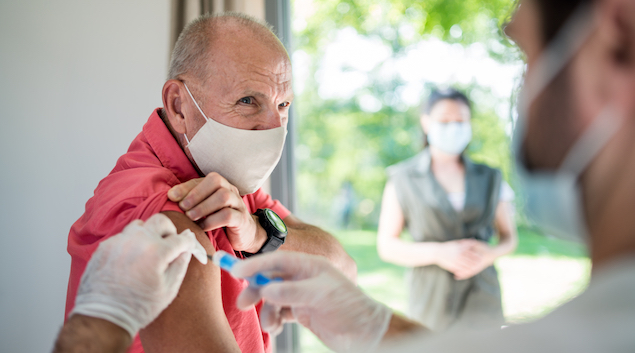Research Article Describes Inadequate Funding Levels for Vaccines Against HIV, Malaria and Tuberculosis
ATLANTA, GA, Sept. 19, 2018 (GLOBE NEWSWIRE) — via NEWMEDIAWIRE — GeoVax Labs, Inc. (OTCQB: GOVX), a biotechnology company developing human vaccines, today commented on a research article describing a study funded by the Gates Foundation. In the article, “Developing new health technologies for neglected diseases: a pipeline portfolio review and cost model”, published at Gates Open Research1, the authors discussed their review of product development pipelines for 35 neglected diseases and over 500 product candidates, concluding there to be a worldwide funding gap over the next 5 years of between $1.5 and $2.8 billion, potentially impacting the development timelines of efficacious vaccines against HIV, Malaria and Tuberculosis.
David Dodd, GeoVax President & CEO, commented, “This study highlights the dire need for increased government and global health organization support for vaccine research and development against various pathogens afflicting humanity. Taking HIV as an example, and examining domestic spending in the United States alone, the federal funding budget request for 2018 includes $26.6 billion related to HIV/AIDS, of which less than $900 million (3%) is designated for domestic vaccine and other prevention research; the rest is mostly directed to care and treatment programs (Sources: Henry J. Kaiser Family Foundation, NIH Office of AIDS Research). These numbers illustrate the stark reality of the ongoing economic burden of HIV/AIDS in the United States, and the dramatic impact that an effective preventive vaccine may have over time. A 2016 report from Research!America further quantifies the impact a vaccine could have on a global scale, stating that “Between 2020 and 2030, an AIDS vaccine could prevent between 5.2 and 10.7 million new HIV infections, saving between $46 billion to $95 billion from the averted costs of current HIV/AIDS treatments alone.” And the human impact in terms of quality of life and vitality is simply immeasurable.
“While we certainly advocate for increased public spending in each of the areas addressed in this article,” Mr. Dodd continued, “we also want to thank the National Institutes of Health which has provided substantial funding (through the National Institute of Allergy and Infectious Diseases) for GeoVax’s HIV vaccine program. Our most advanced vaccines under development are designed to protect against the clade B subtype of the HIV virus that is prevalent in the Americas, Australia, Japan and Western Europe. Our preventive clade B HIV vaccine has successfully completed Phase 2a human clinical testing and has entered a follow-on clinical trial. This vaccine has shown outstanding safety and excellent, highly reproducible immunogenicity. We have also extended our preventive HIV vaccine effort to the most common virus subtype affecting the developing world, clade C, and also are investigating our HIV vaccines for their potential to contribute to combination therapies leading to a cure for HIV infections.”
About GeoVax
GeoVax Labs, Inc., is a clinical-stage biotechnology company developing human vaccines against infectious diseases using its MVA-VLP vaccine platform. GeoVax was the winner of the 2018 “Best Biotech” Vaccine Industry Excellence Awards, a finalist for the 2018 “Best Prophylactic Vaccine” Award for its Zika vaccine at the World Vaccine Congress, as well as a finalist for Pipelines of Promise at Buzz of Bio 2018. The Company’s development programs are focused on vaccines against HIV, Zika, hemorrhagic fever viruses (Ebola, Sudan, Marburg, Lassa) and malaria. GeoVax also is evaluating the use of its MVA-VLP platform in cancer immunotherapy, and for therapeutic use in chronic Hepatitis B infections.
GeoVax’s vaccine technology is based on its Modified Vaccinia Ankara (MVA) Virus-Like Particle (VLP) platform, which generates noninfectious VLPs in the individual being vaccinated. Gene sequences of target antigens are inserted into the MVA genome which drives their expression in infected cells. In addition, GeoVax introduces into the viral genome matrix sequences that incorporate antigens into VLPs and simultaneously facilitate their budding from the membranes of host cells. In this way, vaccination induces two pools of antigens as targets for the immune response – host cells and VLPs secreted from host cells. This strategy mimics a natural viral infection, triggering the body to produce a robust and durable immune response with involvement of both antibodies and T cells.
For more information, visit www.geovax.com.
Forward-Looking Statements
Certain statements in this document are “forward-looking statements” within the meaning of the Private Securities Litigation Reform Act. These statements are based on management’s current expectations and are subject to uncertainty and changes in circumstances. Actual results may differ materially from those included in these statements due to a variety of factors, including whether: GeoVax can develop and manufacture its vaccines with the desired characteristics in a timely manner, GeoVax’s vaccines will be safe for human use, GeoVax’s vaccines will effectively prevent targeted infections in humans, GeoVax’s vaccines will receive regulatory approvals necessary to be licensed and marketed, GeoVax raises required capital to complete vaccine development, there is development of competitive products that may be more effective or easier to use than GeoVax’s products, GeoVax will be able to enter into favorable manufacturing and distribution agreements, and other factors over which GeoVax has no control. GeoVax assumes no obligation to update these forward-looking statements. More information about these factors is contained in GeoVax’s filings with the Securities and Exchange Commission including those under “Risk Factors” in its Form 10-K.
Contact:
GeoVax Labs, Inc.
investor@geovax.com










